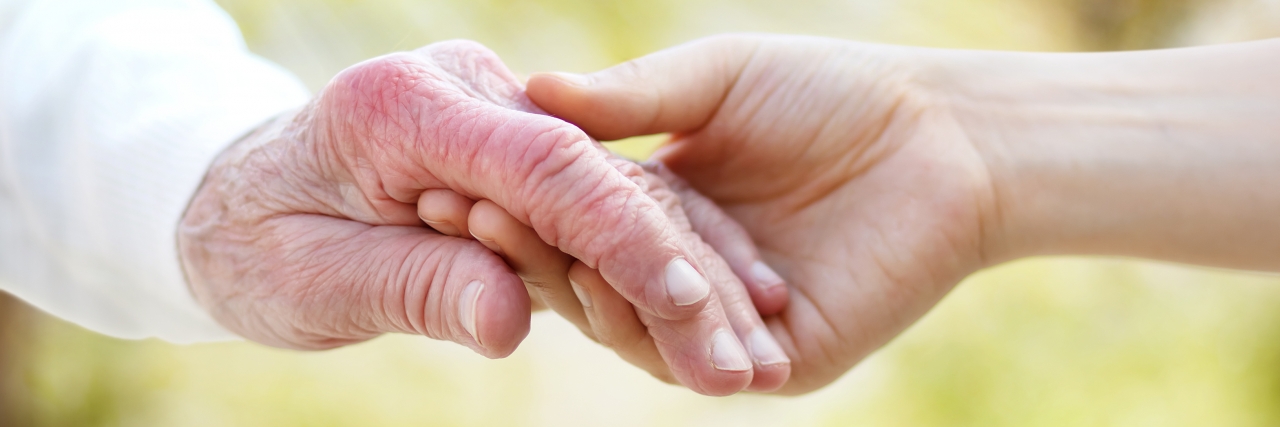Eight years ago, my father passed away after a long battle with Alzheimer’s. As I sat by his bedside, my thoughts turned to all those moments in my life when he was my caregiver. More than just his role as the dutiful parent, he became my main caregiver when I developed juvenile rheumatoid arthritis at 13 years old.
• The Mighty’s Caregiving Toolkit
My father was the one who drove me to and from doctors’ appointments, reminded me to take my medicines and even was my therapist. For two long years, my after-school activity consisted of sitting in a chair watching “General Hospital,” wearing a neck brace that was tied to a thick rope, and on the other side of the door was a bag filled with gallons of water. My father had to place me in “traction” every single day, although it was very difficult for him to see me in such pain. I remember begging him, “Not today, let me have a day off,” but he never gave in. He knew that although it hurt me, in the long run it would be beneficial for me.
As I sat there by his side those long days before he died, I thought of the important role of caregivers. Since arthritis is a disease of mobility, the role of the caregiver is essential. There are over 50 million Americans diagnosed with arthritis, and each has at least one caregiver. The role of the caregiver is important no matter what age we are diagnosed with arthritis. The role takes on various forms throughout the lifespan of a person with arthritis.
It is the parent of a child with arthritis who wakes up earlier than usual to prepare a warm bath, so their child can move his/her joints before heading off to school.
It is the parent who has to prepare a good breakfast because their child will need to take morning medicines. It is the strength of a parent who cries in the shower alone, but puts on a brave face in front of their child as they prepare their Enbrel injection.
It is the boyfriend/girlfriend of a person with arthritis who learns to hold their hands differently because crossing their fingers is way too painful.
It is the spouse of a person with arthritis who quietly helps his loved one dress, put on their shoes, and get ready to face the world every day, while no one else has any idea of what it may have taken to get them out the door.
It is the spouse who waits patiently after the surgical doors close, leaving them alone with their thoughts and prayers as their loved one undergoes yet another surgery.
It is the child of a person with arthritis who grows up all too soon by taking care of their parent, reversing the traditional caretaker roles. These children, who mature before their time, learn to take on a myriad of adult-type responsibilities.
I intimately know each of these caregiver roles because my husband and daughter have continued the legacy my father began. Throughout the years, my arthritis has destroyed both my hips, my right shoulder, and both jaws. Thus, I have had to undergo seven joint replacements. To have a part of your body removed and replaced by metal makes you feel less human and more robotic only if you allow it to do so. For though it is quite painful, it quickly puts life into perceptive.
After each surgery I felt as though I had been robbed of my abilities as a human being. I could not move without aid. When I began to walk, I could not simply get up and move. I remember giving my legs the command to move, but they stood as still as Roman pillars on an archaic building. With time, as my muscles came back to me, I began to move my legs, and soon I was walking ever so slowly again. Through the weeks of therapy, I progressed from a walker a cane to walking on my own. I felt as autonomous as a toddler taking her first steps.
With this newfound independence also came a great deal of inner wisdom. The little everyday movements became small victories as I acquired them. I began to realize what truly matters in life are the people around you, the support system that stays behind when the surgical doors close. Once they are reunited with you, they search for ways of helping you deal with your pain and inability to move. This support system, the caregivers, whether it is comprised of one or many, is the essence of recovery. I got up and walked across the room because my husband or daughter was on the other side, waiting to surround my body with their arms.
It was that one hug that made all the pain worth it. It was their mere presence day after day that made me realize that although I have one more piece of metal inside my body, I am still the same person with the same hopes and aspirations.
Although my father is gone, he left me with wonderful memories and a legacy to help others in need. This example of service to others is what lies at the core of the Arthritis Foundation’s mission statement. Let us never lose hope that one day arthritis will be conquered, but in the meantime, let us continue to fight the good fight and care for everyone around us.

